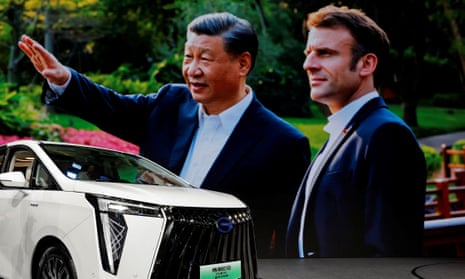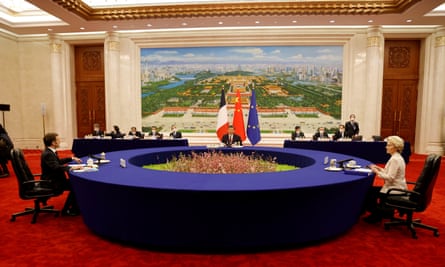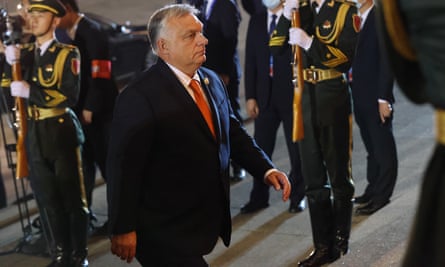
Xi Jinping to visit France, Hungary and Serbia amid EU trade tariff row
China’s president arrives as EU anti-subsidy investigations and tensions over espionage, Ukraine and Taiwan continue
China’s president, Xi Jinping, is to visit Europe next week for the first time in five years, in a tour that will take in the unlikely trifecta of France, Hungary and Serbia.
The visit comes as China pushes to avoid a trade war with the EU, while attitudes towards Beijing in the bloc are hardening after multiple spying scandals and China’s ongoing support for Russia in the war in Ukraine.
Xi’s first stop will be Paris. On Monday, he will meet the French president, Emmanuel Macron, and the president of the European Commission, Ursula von der Leyen.
“The Chinese leadership is pretty clear about what they want,” says Abigaël Vasselier, the director of foreign relations at Merics, a German thinktank focused on China. Xi would be focused on lobbying against the EU’s anti-subsidy probes, particularly on electric vehicles (EVs) and on stabilising the bilateral relationship, Vasselier said.
In September, in remarks widely understood as being directed at China, von der Leyen said that global markets were “flooded with cheaper electric cars … [whose] price is kept artificially low by huge state subsidies”. The probe has caused widespread consternation in Beijing, which sees it as unfair and politically motivated.
On Thursday, the European Commission’s trade chief hinted that tariffs on Chinese EVs could be imposed by June, after the launch of an investigation into state support for electric car manufacturing in China. The deadline for any measures to be imposed is 4 July.
China “cannot afford to have more and more restrictions to the European market”, Vasselier says, but at the same time, “China does not have an offer for Europe at this point”.
That is because one of Europe’s – and Macron’s – longstanding asks of China is for Xi to put pressure on Vladimir Putin, Russia’s president, to end the war in Ukraine. “Two years into the war, the Europeans have realised … this is not going to happen,” says Vasselier.
Prof Shen Dingli, a Shanghai-based international relations scholar, says that for China, the question of Taiwan was more important than that of Ukraine.

Macron, von der Leyen and Xi last met in person in April last year when the Europeans flew to Beijing. Macron, who arrived with a 50-strong business delegation and left with 18 cooperation agreements inked between French and Chinese companies, caused a storm on that trip when he told reporters that Europe should not become “America’s followers” on the Taiwan issue. The US president, Joe Biden, has repeatedly said that the US would defend Taiwan militarily in the event of an attempted Chinese annexation.
“When the French president visited China last year … he made it very clear: on the question of Taiwan, France should have its own independent position,” Shen says. “China appreciates his position.”
Xi and Macron’s personal rapport was burnished last year when the Chinese president took his French counterpart on a rare personal trip to Guangzhou, a city in southern China. Next week, Macron will return the favour with a visit to Hautes-Pyrénées, a mountainous region of France.
But despite Xi and Macron’s personal chemistry, “Chinese Communist party leaders don’t have friends. They have interests,” says Charles Parton, a senior associate fellow at the Royal United Services Institute and a former British diplomat in China. “It’s a way of ruthlessly pushing forward your own interests.”
“Wherever China sees benefit from dealing with Europe as a whole, then it does. When it sees the benefit of dealing with individuals, sometimes because it undermines the whole, then it deals with individuals,” Parton says.
after newsletter promotion
The EU’s investigation into alleged state support into the car industry is one of a series ordered by Brussels into supplies to Europe including medical devices and wind turbines, which are being sold at 50% of the cost of those made in Europe – long considered the lead in the sector. China argues that the trade investigations are politically motivated and the only loser in a tariff war would be the consumer.
The emphasis on bilateral relations comes as China’s relationship with the bloc is increasingly strained. There are also concerns in the EU about disinformation and foreign interference, with the arrest of an assistant to the German AfD MEP Maximilian Krah on suspicion of spying for the Chinese.
On 24 April, the Dutch and Polish offices of the Chinese security equipment company Nuctech were raided by EU competition regulators as part of a new anti-foreign subsidy investigation. The move, which was directed by the European Commission, was immediately condemned by China’s commerce ministry.
Tariffs on EVs will be even more troubling for Beijing. Last year, EU imports of EVs from China reached $11.5bn, according to Rhodium Group.

Xi will also be visiting one of his closest allies in Europe, Hungary’s prime minister, Viktor Orbán. China-Hungary relations have become increasingly close in recent years. In February, China offered to deepen law enforcement ties with Hungary, taking its already cosy relationship beyond the economic realm and into a security cooperation agreement that sparked concern in other EU countries. Hungary is already Huawei’s largest base outside China, and the country will soon host carmaker BYD’s first European factory.
In return, Orbán has been a vocal supporter of China in international forums. On several occasions, Hungary has opposed EU motions critical of China on human rights.
The most symbolic stop on the tour will be Xi’s visit to Belgrade, around the 25th anniversary of the US’s bombing of the Chinese embassy in the Serbian capital. The incident, in which three Chinese journalists were killed, caused a huge spike in anti-US sentiment in China. It also hardened China’s hostility to Nato, as the strike happened during the alliance’s bombing of Yugoslavia.
China’s hostility to Nato is part of the reason why Beijing has maintained its support for Moscow since the invasion of Ukraine. Xi’s visit will “remind the world that although China and Serbia are geographically separated by the Eurasian continent, they share the same security interests. We need to strengthen our cooperation to overcome the security threats from the US and Nato,” Shen says.
The Belgrade visit is not as strategically important as the meetings in Paris and Budapest. But, says Parton, “it fitted the timetable. And it sure as hell fits their intentions and interests in highlighting American behaviour.”